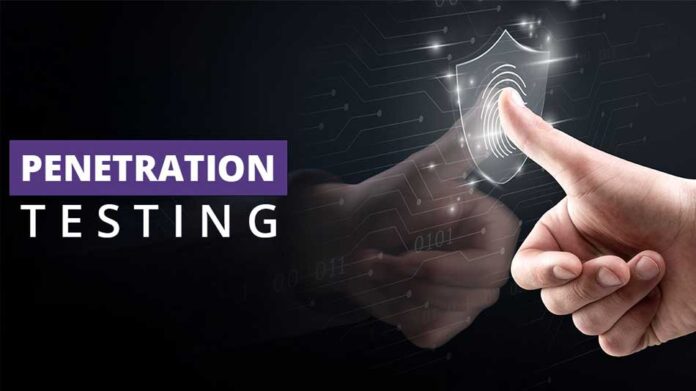Table of Contents
Modern businesses increasingly depend on technology for their daily operations, which brings many advantages but also increases the risk of cyberattacks. According to reports released in 2023, three out of four U.S. companies could potentially face a significant cyberattack threat.
Companies must take proactive measures to safeguard sensitive data and ensure the resilience of their IT systems, with pen testing (also referred to as penetration testing) serving as one such solution. By simulating cyberattacks against computer systems, networks, or web applications, penetration testing helps identify any vulnerabilities exploitable by hackers.
Deliberating and understanding potential vulnerabilities within your IT infrastructure helps identify corrective measures that can bolster defenses. So integrating penetration testing into your cybersecurity strategy is vital for maintaining the trustworthiness and integrity of your business in an environment rife with digital threats that constantly evolve.
Knowing the main pen testing steps and methodologies and implementing them can substantially lower breach risks, providing customers and stakeholders with peace of mind that your company remains secure, resilient, and trustworthy.
Identifying and Mitigating Risks
One of the main advantages of penetration testing for businesses is its ability to proactively detect vulnerabilities within their system before malicious actors exploit them, giving time and opportunity to address and rectify issues before becoming more serious threats and safeguarding sensitive data.
Understanding where defenses may be weak enables you to allocate resources more strategically for strengthening cybersecurity posture. Acknowledging system vulnerabilities provides more precise control of security measures and investments can be directed more closely toward protecting critical areas. Identifying vulnerabilities early reduces data breaches while making security measures cost- and time-effective.
Complying With Regulatory Requirements
Companies, particularly in finance, healthcare, and retail environments, emphasize adhering to regulatory norms. Compliance with data protection regulations such as HIPAA, PCI-DSS, and GDPR requires stringent adherence. Through penetration testing services, companies ensure their systems adhere to these regulations to avoid fines or legal complications for noncompliance.
Penetration testing demonstrates legal compliance as well as businesses’ commitment to protecting client data. Furthermore, this proactive stance towards data security may strengthen the company’s standing with partners and clients by identifying vulnerabilities quickly. By eliminating them quickly, businesses can confidently declare compliance with regulatory demands while also protecting sensitive information and building trust among stakeholders.
Building Customer Trust
Businesses demonstrate their dedication to data security by conducting penetration tests frequently, which helps strengthen their reputation and build customer trust. Knowing that customer data is actively protected can have a significant effect on engagement and loyalty; therefore, adopting robust security measures and testing systems regularly are vital steps businesses must take to safeguard sensitive information and foster long-term success.
Avoiding Financial Losses
Data breaches often impose enormous financial costs upon organizations as well as irreparable harm to their brand’s reputation. Penetration testing helps mitigate breaches’ associated risks by protecting companies against system downtimes, legal fees, and regulatory fines that result from an attack. Incorporating penetration testing can save companies far greater costs from cyberattacks by protecting against future attacks in terms of time and resources spent dealing with them.
Enhancing Incident Response and Management
Penetration testing identifies vulnerabilities while simultaneously testing your incident response strategies. Businesses can utilize penetration testing as a means of fine-tuning response protocols and quickly responding to security incidents should any arise. An effective incident response can significantly lessen its impact and help minimize the impact of breaches.
Safeguarding Business Resources and Intellectual Property

Businesses frequently possess sensitive data that, if compromised, could lead to significant losses and competitive disadvantage. Penetration testing provides a valuable service in protecting intellectual property, trade secrets, and other essential business assets from cyberattacks while guaranteeing continuous operations without interruptions.
Promoting a Security-Aware Culture
Penetration test participants create an environment of security awareness within their organizations. Regular participation highlights the significance of cybersecurity for staff members as they receive training about potential risks that threaten company security while creating common awareness that helps prevent human errors that lead to security breaches.
Adapting to Changing Dangers
Cyber risks are ever-evolving due to hackers’ inventive methods for breaching networks. Penetration testing helps businesses stay one step ahead by identifying both current and potential future vulnerabilities that could pose threats, keeping their cybersecurity defenses up-to-date and strong enough against hacker techniques used against them.
Wrapping Up
Penetration testing plays a key role in maintaining robust cyber defense, from early identification and mitigation of threats before they escalate into full-fledged security incidents to compliance with regulatory standards, customer trust building, avoiding financial losses as well as improving incident response mechanisms to stay ahead of ever-evolving threats. Penetration testing plays an essential part in keeping cyber defenses strong.
Businesses can strengthen their defenses, protect their reputations, and secure long-term success in today’s digitally driven marketplace by performing thorough penetration testing steps. By taking proactive steps for cybersecurity protection, they not only secure immediate interests but also prepare against unpredictable digital landscape threats that may emerge over time.















